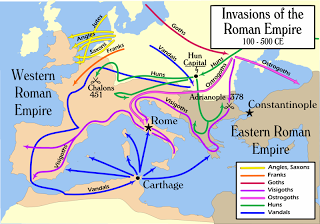by Jack Le Moine

From the latest happenings in things historical. This article Why Ancient Rome Matters was published yesterday in The Guardian Newspaper. The article’s author is Mary Beard. She is Professor of Classics at Cambridge University.
This historian thinks that lessons Rome learned can be applicable to us and recent events in our history.
Inevitably, the Rome with which we engage is a moving target. Roman history has changed dramatically over the last 50 years, and even more so over the last 250 years since Edward Gibbon wrote The Decline and Fall of the Roman Empire, his idiosyncratic historical experiment that began the modern study of Roman history in the English-speaking world (and which certainly would have been on Palmerston’s desk). That is partly because of the new ways of looking at the old evidence, and the different questions we choose to put it. It is a dangerous myth that we are better historians than our predecessors. We are not. But we come to Roman history with different priorities – from gender identity to food supply – that makes the ancient past speak to us in a new, as well as an old, idiom.
“There have also been an extraordinary array of new discoveries – in the ground, under water, even lost in libraries – presenting novelties from antiquity that tell us more about ancient Rome than any modern historian before us could ever have known. We now have a manuscript of a touching essay by Galen, a Roman doctor whose prize possessions, kept in a lock-up store in the centre of Rome, had just gone up in flames; this resurfaced in the library of a Greek monastery only in 2005. We have discovered wrecks of Mediterranean cargo ships that never made it to Rome, with their foreign sculpture, furniture and glass destined for the houses of the rich, and the wine and olive oil that were the staples of everyone.”
Leave a Reply
You must be logged in to post a comment.